#mildred dunnock
Text
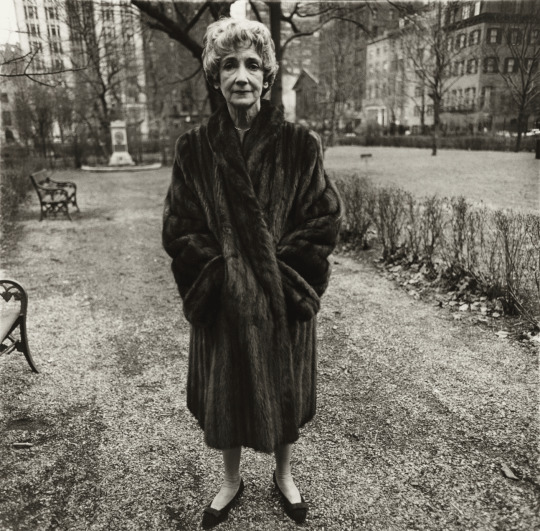
Mildred Dunnock, N.Y.C. 1964
Photo: Diane Arbus
79 notes
·
View notes
Text
"The first requirement of acting: to believe in what you’re doing"
MILDRED DUNNOCK TALKS ABOUT WORKING WITH ELVIS IN LOVE ME TENDER


It was an odd role in which to make his screen debut, but Elvis gave it his all and tried not to be intimidated by his costars, who included the fine character actress Mildred Dunnock, twice nominated for an Academy Award, as his mother. Critics would pan the novice actor — he was, after all, an easy target — but Dunnock was surprised at his solid performance.
“When I came back from making the picture, my friends saw it and said, ‘Why Millie, this boy can act!’ This rather threw me, because I said I had spent twenty-five years trying to learn how to act, and Elvis Presley hadn’t spent twenty-five minutes. So I do not in any way depreciate his value as an actor.”

The truth was, Dunnock, a fellow southerner, had taken a shine to Elvis, and when he confessed to her that he didn’t really know what to do, how to make the lines ring true, she took it upon herself to coach him. First the former schoolteacher had to educate him in the art of theatrical projection.

“Elvis would have a line like, ‘Can’t do it, Maw, can’t do it.’ And he would say [it] really pleasant and nice. But I’d tell him to say it like he really meant it. And after a certain number of tries he would finally say [with strong emphasis], ‘I can’t do it, Maw, I can’t do it!’ And Mr. Webb would say, ‘Shoot.’ ”
In one of the film’s most crucial scenes, the family was led to believe that the Yankees had killed Clint’s brother. “He really hadn’t been killed,” Dunnock remembered, “but my baby Elvis was upstairs, and I was in the kitchen cooking. There was only one line of dialogue in this scene, and it was mine. All the rest was plain action. I was going to say it firmly, so I rehearsed it and rehearsed it. The lighting men decided what they were going to do, and we sat down and drank Coca-Colas and waited for about two hours.”
As Dunnock told the story, the director finally said, “Everything seems ready, so let’s rehearse it one time.” Elvis said, “Yes, sir, Mr. Webb.”
Then the director took Elvis through it, saying, “In this scene, the Yankees come by horse up into the backyard, which you can see from your window upstairs. You come down and go to the window and see those Yankees kill your brother. You go to the sideboard, open the drawer, and pull out a gun. You start across that floor to go meet those damn Yankees, and end of scene.”
“Yes, sir,” Elvis said confidently.
“The Yankees are going to rap on the door,” Webb continued. “I’ll go, ‘Ready, lights, shoot,’ then I’ll make a knocking sound, and that’s your cue to come down those stairs. Understand?”
“Yes, sir.”
Webb called for action, and rapped out the knock.
In Dunnock’s retelling, “Elvis came down those stairs, went to that sideboard, took out that gun, and when I said my line, ‘Put that gun down, son!,’ well, he dropped it right away. Mr. Webb said, ‘Cut! Cut! Oh, my God, what are you doing? You’re supposed to keep on going!’ Elvis said, ‘She told me to put it down.’ ”
Most actresses of Dunnock’s caliber would have held her head, livid at having to put up with so inexperienced an actor. But Elvis had gotten to the real mother in her, and she chose to frame his blunder as an asset.
“You see, for the first time he heard me. Before, he was just thinking about what he was doing and how he was going about it. It’s a funny story, [but] I also think it’s a story about a beginner who had the first requirement of acting, which is to believe in what you’re doing.”
Excerpt from book "Baby, Let's Play House: Elvis Presley and the Women Who Loved Him" (2010) by Alanna Nash
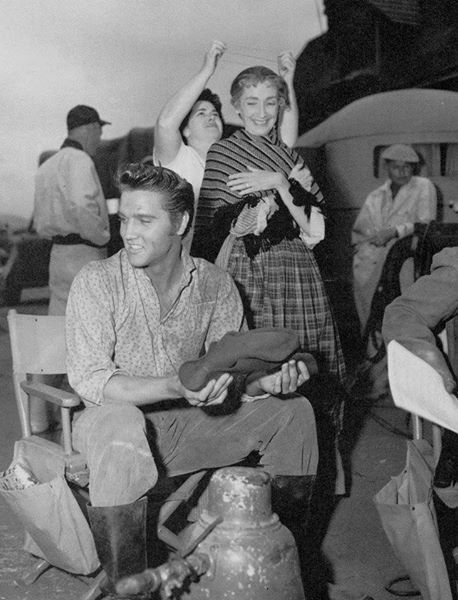
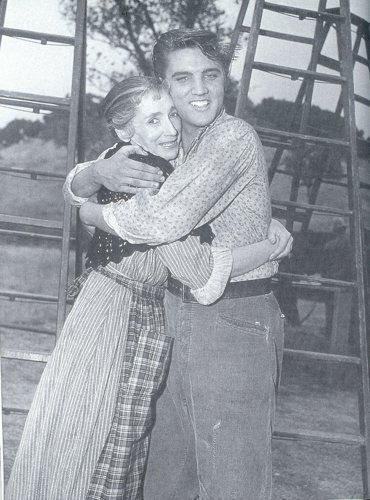

Elvis and Mildred Dunnock. Love Me Tender (1956)
#elvis presley#mildred dunnock#love me tender#1956#elvis#elvis the king#elvis fans#elvis fandom#elvis history#50s elvis#50s movies#elvis movies#elvis films
48 notes
·
View notes
Text
Arthur Miller's "Death of a Salesman", starring Lee J. Cobb, Arthur Kennedy, Mildred Dunnock , Cameron Mitchell, and directed by Elia Kazan, opened at Morosco Theatre in NYC on February 10, 1949.

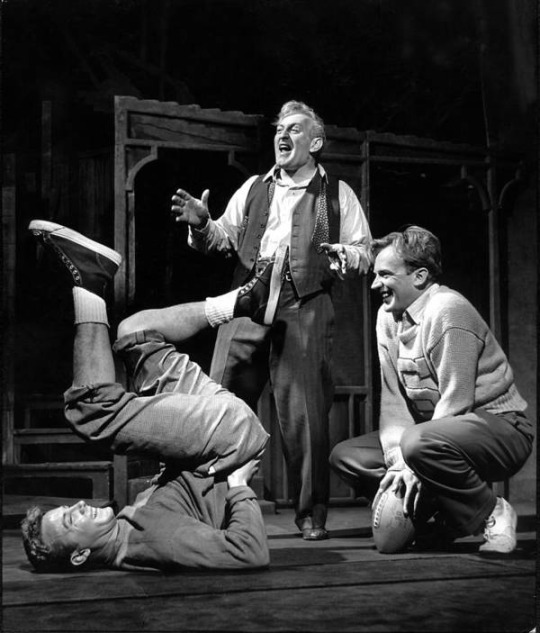
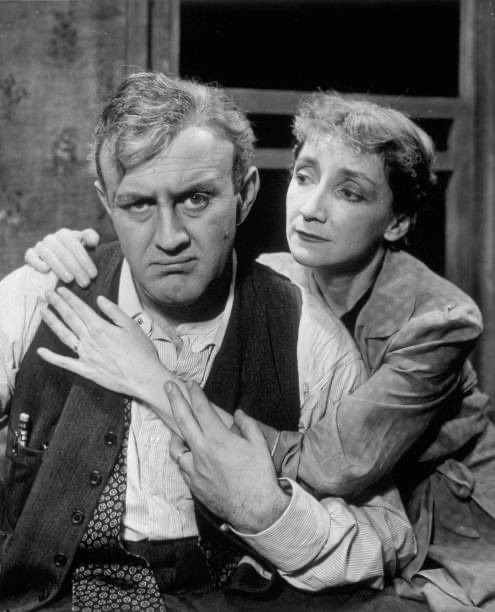
Arthur Miller's "Death of a Salesman", starring Lee J. Cobb, Arthur Kennedy, Mildred Dunnock , Cameron Mitchell, and directed by Elia Kazan, opened at Morosco Theatre in NYC on February 10, 1949.
29 notes
·
View notes
Text

Fredric March-Mildred Dunnock-Kevin McCarthy-Cameron Mitchell "La muerte de un viajante" (Death of a Salesman) 1951, de Laszlo Benedek.
4 notes
·
View notes
Photo

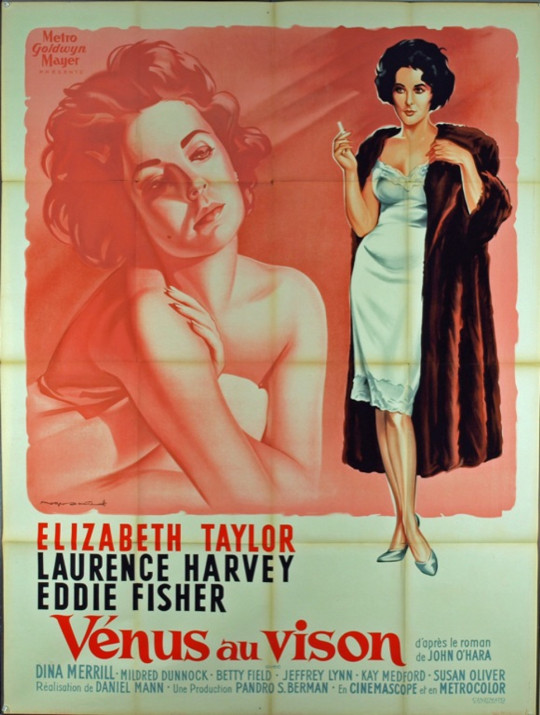
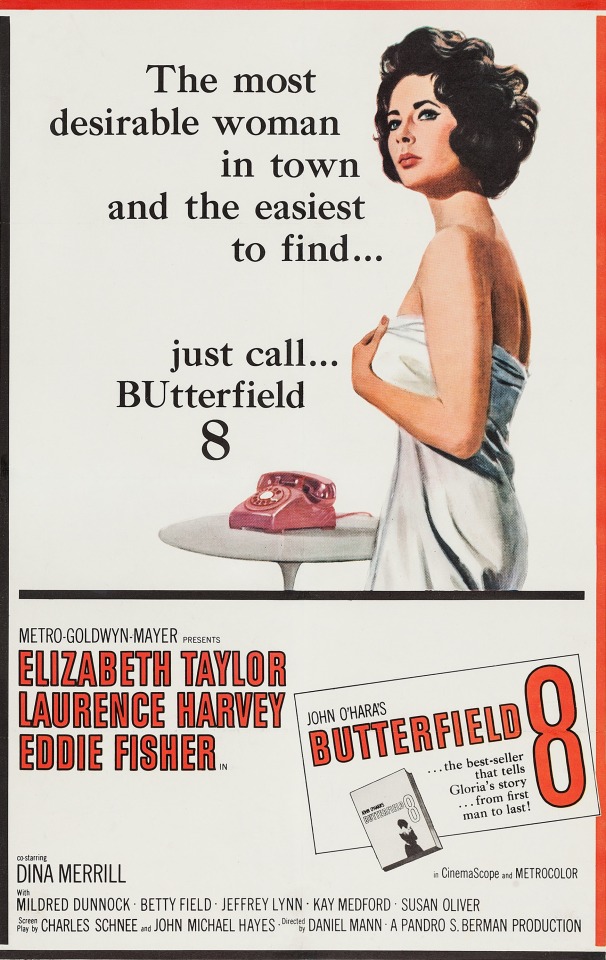


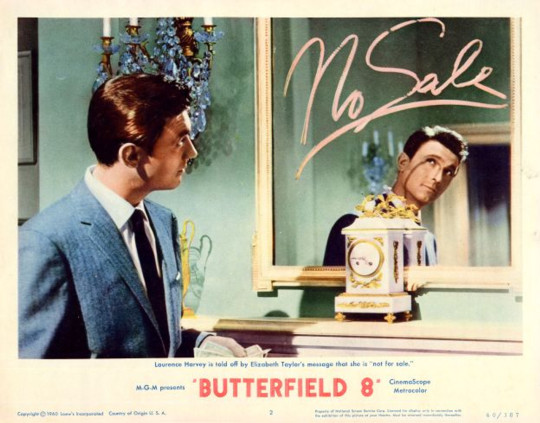

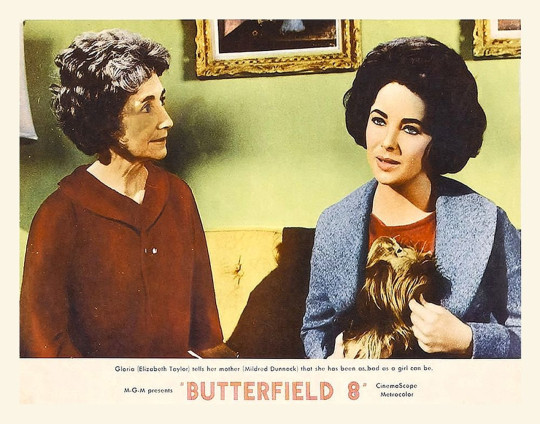
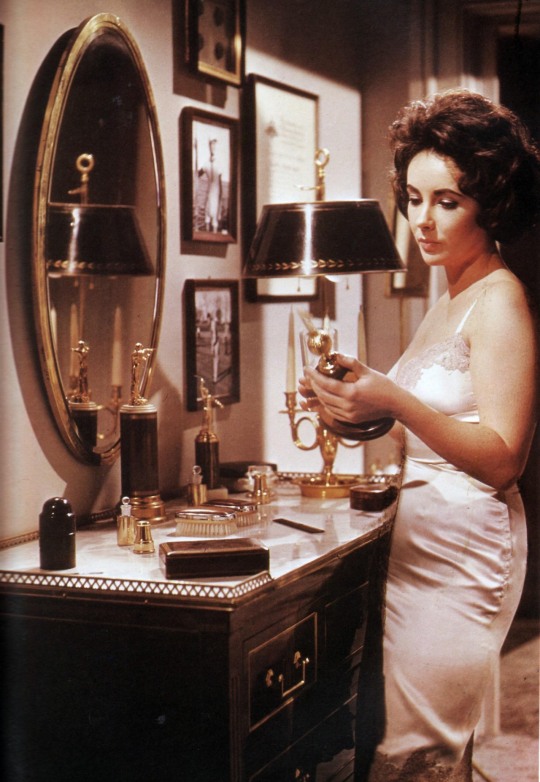

BUtterfield 8 (Butterfield 8) (1960) Daniel Mann
December 10th 2022
#butterfield 8#1960#daniel mann#elizabeth taylor#laurence harvey#eddie fisher#dina merrill#mildred dunnock#susan oliver#betty field#kay medford#jeffrey lynn#john o'hara's butterfield 8
23 notes
·
View notes
Photo

- When I saw him, he was dead.
- He looked exactly the same when he was alive, only he was vertical.
The Trouble with Harry, Alfred Hitchcock (1955)
#Alfred Hitchcock#John Michael Hayes#Edmund Gwenn#John Forsythe#Shirley MacLaine#Mildred Natwick#Mildred Dunnock#Jerry Mathers#Royal Dano#Parker Fennelly#Barry Macollum#Dwight Marfield#Robert Burks#Bernard Herrmann#Alma Macrorie#1955
10 notes
·
View notes
Text
Something Wild

Rarely have I seen a film so thoroughly squander a strong first half as does Jack Garfein’s SOMETHING WILD (1961, Criterion Collection). It doesn’t just squander the first part’s good will. It throws it to the ground, kicks it in the face and puts out its eye. That’s particularly distressing since it has some very good people — Carroll Baker, Ralph Meeker and Mildred Dunnock — in leading roles. College student Baker is raped on her way home from school and, in the film’s strongest scenes, bottles up the experience even as the trauma changes her life. She comes home to wrap herself in a blanket and shiver next to the radiator, scrub herself in the bath and cut the clothing in which she was attacked into pieces to flush down the toilet. She then runs off to live in a run-down boarding house (with Jean Stapleton as the hooker next door) and work at Woolworth’s, where her inability to connect is misinterpreted as snobbishness by co-worker Doris Roberts (in her film debut). This is all done with a focus on subtleties of behavior. It’s clear early on that Garfein is great at finding visual expressions of his characters’ inner states. He’s not that good with action, though, and the rape scene, another attack on Baker and her bullying by co-workers all fall flat. The rest of his work is so strong that’s forgivable. But then auto mechanic Ralph Meeker stops Baker from throwing herself off the Manhattan Bridge, offers her a safe haven and locks her in. At this point, the psycho-drama turns absurd and not in a good way. The two actors are required to go from zero to 60 too many times, and some of their liners are funny in that “What were they thinking?” way. When Baker turns down Meeker’s marriage proposal, he yells, “What’s wrong with me,” after he’s held her prisoner, drunkenly tried to rape her and berated her for not seeming happy about the situation. The actors are still good, at least in silent moments, but it’s hard to recover from dialog like that or the hopelessly sentimental ending. Dunnock is quite good as Baker’s mother, and the cinematography by Eugen Shuftan, score by Aaron Copeland and credits sequence by Saul Bass are all terrific. For the rest, it’s maddening to see a sensitive depiction of a woman’s response to rape suddenly turn into an incel’s wet dream.
0 notes
Text
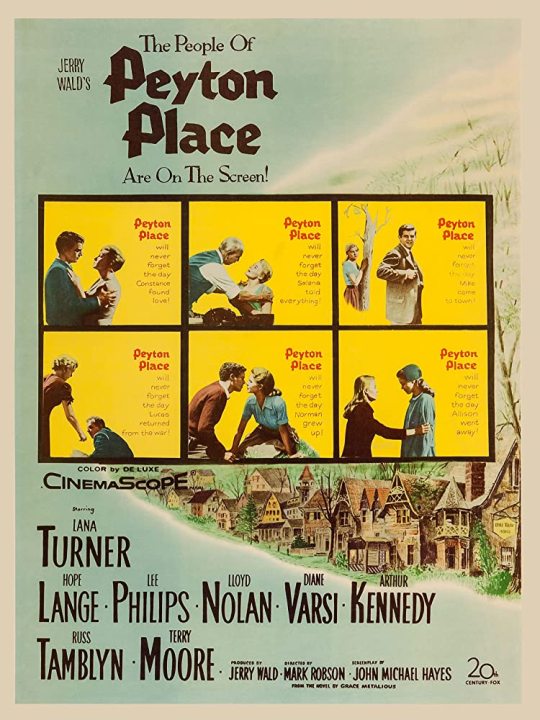
4.28.23
#film#letterboxd#watched#peyton place#lana Turner#hope lange#lee Phillips#arthur kennedy#lloyd nolan#russ tamblyn#terry moore#david nelson#barry coe#betty field#mildred dunnock#leon ames#lorne greene#staats cotsworth#peg hillias#mark robson
1 note
·
View note
Text
Movie of the Month: Peyton Place (1957)
Every month one of us makes the rest of the crew watch a movie they’ve never seen before, and we discuss it afterwards. This month Britnee made Boomer, Brandon, and Alli watch Peyton Place (1957).
Britnee: I love drama. Soap operas like The Bold and the Beautiful and Days of Our Lives were the inspiration for “playing pretend” with my Barbie dolls when I was a wee one. Now, as a grown adult, I…

View On WordPress
#brandon ledet#britnee lombas#diane varsi#hope lange#lana turner#lee phillips#Lists & Articles#mark boomer redmond#melodrama#mildred dunnock#movie of the month#peyton place#soap operas
0 notes
Photo
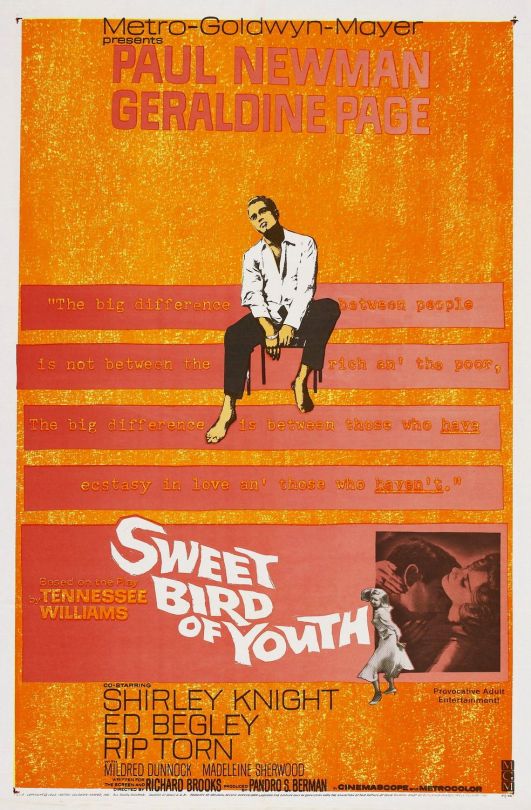
#sweet bird of youth#paul newman#geraldine page#shirley knight#ed begley#rip torn#mildred dunnock#madeleine sherwood#richard brooks#1962
1 note
·
View note
Text
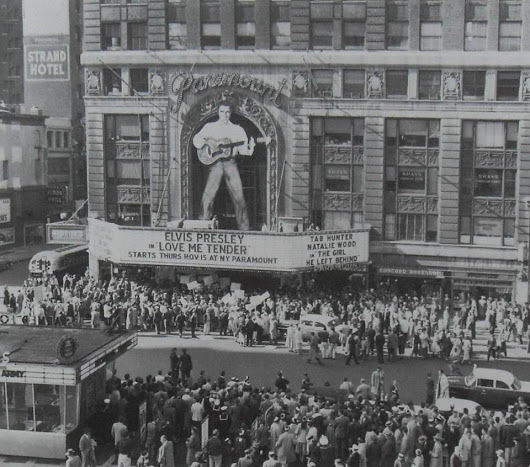
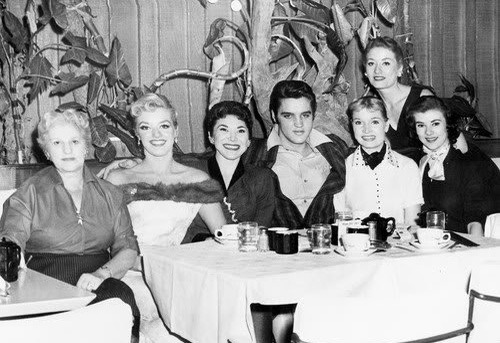


November 15, 1956
Elvis Presley‘s first feature film “Love Me Tender,” co-starring Richard Egan, Debra Paget, Robert Middleton, Neville Brand, Mildred Dunnock, William Campbell, Bruce Bennett, and James Drury, opened in U.S. and Canadian movie theaters.
Dorothy Dorben’s Venus Starlets at New Frontier – Marilyn Evans with handkerchief.
Elvis visited the late show of Liberace at the Clover Room of the Riviera Hotel. Afterwards he visited Liberace backstage and even fooled around for some photographers.
youtube
#elvisaaronpresley#elvispresley#elvis#graceland#elvis history#elvishistory#tcb#elvis fans#elvis presley#elvis the pelvis#elvis music#elvis the king#50s elvis#1956#elvis movie#love me tender#Youtube
15 notes
·
View notes
Photo

Lana Turner and Diane Varsi in Peyton Place (Mark Robson, 1957)
Cast: Lana Turner, Lee Philips, Diane Varsi, Hope Lange, Arthur Kennedy, Lloyd Nolan, Russ Tamblyn, Terry Moore, David Nelson, Barry Coe, Betty Field, Mildred Dunnock, Leon Ames, Lorne Greene. Screenplay: John Michael Hayes, based on a novel by Grace Metalious. Cinematography: William C. Mellor. Art direction: Jack Martin Smith, Lyle R. Wheeler. Film editing: David Bretherton. Music: Franz Waxman.
Take the sex away from Grace Metalious's lurid novel Peyton Place and what you have left is a portrait of small-town narrow-mindedness and hypocrisy, very much in the tradition of fiction by much better writers, from Mark Twain to Sherwood Anderson, Sinclair Lewis, and William Faulkner. Squeezed by the strictures of the Production Code, the film version of the novel becomes a kind of reworking of Thornton Wilder's Our Town. There was narrow-mindedness and hypocrisy in Wilder's Grover's Corners, but only in the background. It bubbles to the surface in the adaptation of Metalious's novel, which replaces Wilder's heroine, the romantic Emily Webb, who loves her family and her town, with the embittered Allison MacKenzie (Diane Varsi), who hates not only the gossip-ridden town but also her mother, Constance (Lana Turner), for having withheld the information that Allison is the product of Constance's liaison with a married man. The film version of Peyton Place turns what in the novel was sexual molestation of a girl by her father into a rape by her stepfather, side-stepping the incest issue a bit, and converts an abortion into a miscarriage. The randy teenagers of the novel do nothing more shocking in the film than make out a bit and go skinny-dipping. The film hints a little that the shy mama's boy Norman Page (Russ Tamblyn) may be gay -- he refers to himself as a "sissy" once -- but relieves him of that stigma by having him join the paratroopers when war breaks out and come home bold and no longer shy. (It would never occur to Hollywood or its audiences of the day that a gay man could be bold and masculine.) In short, Peyton Place makes today's viewer do a lot of decoding. Which, aside from the fact that at 157 minutes it's overlong and a lot of the dialogue is heavy-handedly expository (and sometimes just banal), doesn't fatally undermine it as entertainment. There are some very good performances: Varsi, Turner, and Tamblyn received Oscar nominations, as did Arthur Kennedy as the slavering rapist stepfather, and Hope Lange as his victim-stepdaughter. Metalious, of course, hated it all the way to the bank.
3 notes
·
View notes
Text
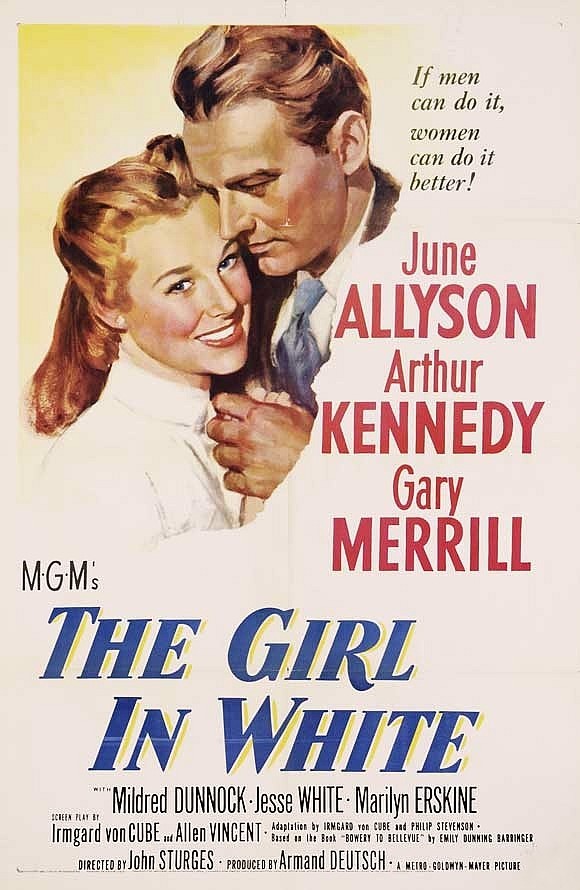
Day 37- Film: The Girl in White
Release date: June 23rd, 1952.
Studio: MGM
Genre: Drama, biography
Director: John Sturges
Producer: Armand Deutsch
Actors: June Allyson, Arthur Kennedy, Mildred Dunnock
Plot Summary: In 1890s New York, young Emily Dunning is shocked to meet Dr. Mary Yeomans, a female physician, during a family emergency. Yeomans quickly becomes her mentor, and Emily finds a single-minded determination to become a doctor herself. We follow her through college and her extremely difficult search to find an internship. No one will take her on, despite ranking 3rd out of 286. Finally she secures an internship in a New York hospital, but her struggles to prove people wrong continue.
My Rating (out of five stars): ****
I really enjoyed this film! I worried going in that it might get pretty maudlin, being that MGM made it, and June Allyson starred. (Nothing against Allyson! I like her, it’s just that MGM always loved putting her in really sentimental stuff.) I was pleasantly surprised to find that the film steered relatively clear of that, and I was completely captivated as I watched Dunning’s journey to becoming a doctor and surgeon two decades before women even had the right to vote,
The Good:
The fact that this was a true story made everything about the film more powerful. I was riveted to know more about this amazing woman.
Although Emily encountered mountains of sexism, the film was clearly on her side throughout. Most of the men who treated her badly were supposed to be unlikeable, and the few that weren’t were given the opportunity to have their opinions change as they got to know her.
I absolutely adored Dr. Yeomans. I don’t know if she existed in real life, but I hope so. Both the character and the actress who played her were great.
I really appreciated that the film chose to focus only on her journey to get into college through her internship. A lot of biographical films, even to this day, try to cram an entire lifetime into one film, and it can lose a lot of nuance and power that way. By focusing on her internship especially, we get to learn a lot of really interesting details of what that experience would have been like the aughts of the 1900’s.
I loved the details of a horse driven ambulance! That’s just something we don’t remember- that ambulances at one time were pulled by horses! It was harrowing, and I loved it.
The other historical details of hospitals and medicine at the time- like a rudimentary version of CPR and dealing with a chloral hydrate overdose. One character is also working with the newly discovered radium, getting burns on his hands from handling it.
June Allyson was good in this. She’s always likeable, as long as she isn’t just constantly weeping and helpless. Here she definitely wasn’t, and it was wonderful.
Arthur Kennedy has been one of my favorite discoveries of this project. I don’t know that I’d ever seen a film with him before, and he’s a really interesting actor.
As I’ve said a few times already, the film could have easily gone into melodramatic self-pity. But it really didn’t. Emily didn’t have time to cry and feel sorry for herself. She just kept working to prove people wrong.
The Bad:
There was a fleeting attempt to try to build up some kind of romantic rivalry between her eventual husband, Dr. Ben Barringer, and Dr. Pawling, their internship boss, and it just didn’t come off.
The very final scene was underwhelming. I was glad that it didn’t get overly sentimental, but it could have ended in a much more interesting way.
0 notes
Text
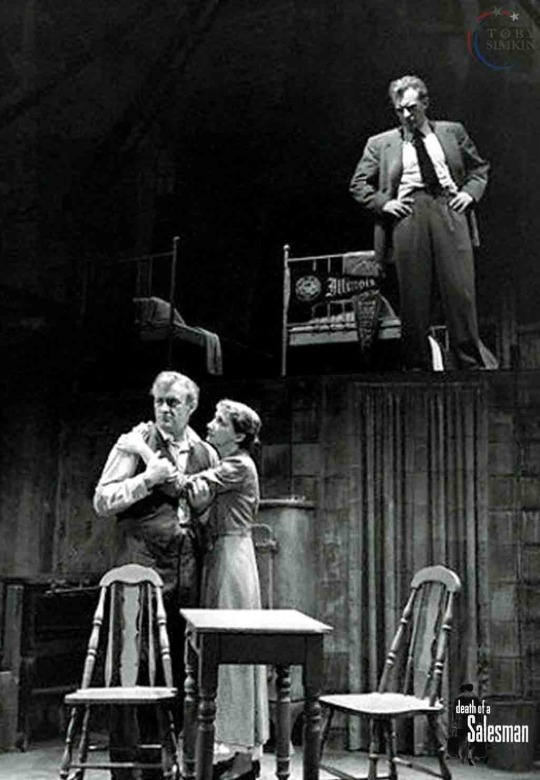


Arthur Miller’s “Death of a Salesman” opened at the Morosco Theatre on Broadway on February 10, 1949. Directed by Elia Kazan and starring Lee J. Cobb, Arthur Kennedy, and Mildred Dunnock, the production won six Tony Awards, the Pulitzer Prize for Drama, and the New York Drama Critics Circle Award for Best Play. #OnThisDay
27 notes
·
View notes
Text

Mildred Dunnock-Bette Davis "El trigo está verde" (The corn is green) 1945, de Irving Rapper.
9 notes
·
View notes
Photo



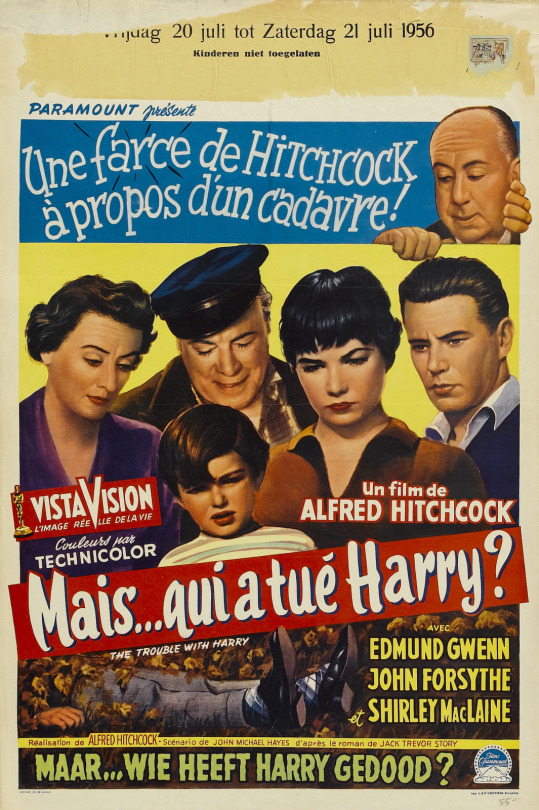



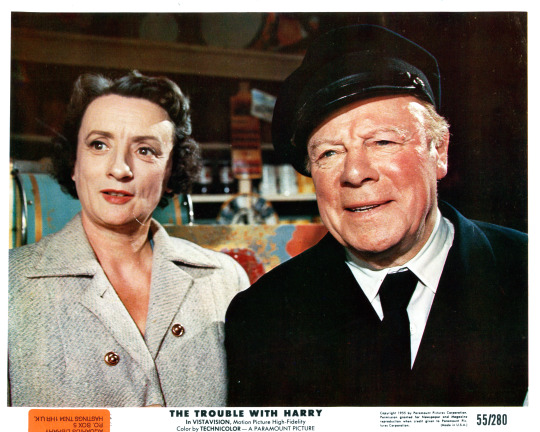


The Trouble with Harry (1955) Alfred Hitchcock
December 30th 2022
#the trouble with harry#1955#alfred hitchcock#edmund gwenn#john forsythe#shirley maclaine#mildred natwick#mildred dunnock#royal dano#jerry mathers#dwight marfield#parker fennelly#alfred hitchcock's the trouble with harry
19 notes
·
View notes